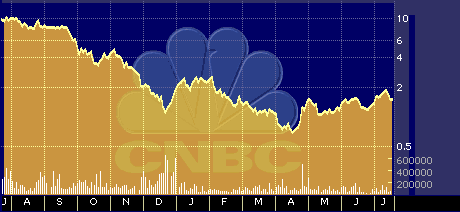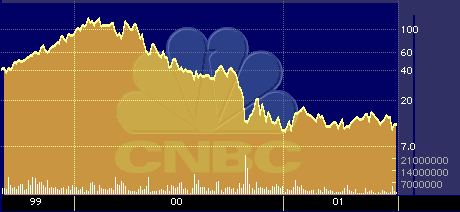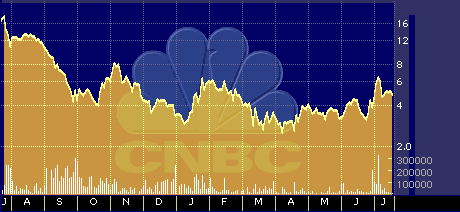
Analysts Cautious on Net Ad Stocks
Analysts Cautious on Net Ad Stocks
by Hal Plotkin
Silicon Valley Correspondent
Several analysts who follow online-advertising trends say investors should approach stocks in the sector with extreme caution, despite huge projected increases in online-ad spending.
“The sector is going to grow in broad terms,” says Chris Hansen, an analyst with Banc of America Securities. “But it’s an area where investors really need to do their homework.”
Hansen cites the initial public offering of Seattle-based Avenue A Inc. {AVEA} as a prime example.
Avenue A provides Internet media planning, buying, ad management, as well as consumer and data-analysis services. Top clients include Gateway Inc. {GTW}, Microsoft Corp. {MSFT}, uBid Inc. {UBID}, and Uproar Ltd. {UPRLF}. The company’s reported sales skyrocketed in the last nine-month period on record, surpassing $34.09 million, up from just $276,000 for the same period a year earlier.
Late Monday, Avenue A priced its 5.25 million shares at 24 a share, higher than its revised filing range of 18 to 20 a share, and well above its initial filing range of 8 to 10 a share.
Propelled by what appears, at least on the surface, to be incredible revenue growth, Avenue A’s IPO recently won a “red hot” designation from Redwood City, Calif.-based Red Herring magazine, a publication aimed at investors and entrepreneurs.
Not so fast, Hansen says.
“What investors need to know, and Avenue A is not shy about this, is that Avenue A is grossing up their revenues,” he says.
Hansen notes that Avenue A’s gross-sales figure includes funds the company merely passes along to the firms it purchases ads from on behalf of clients. It is similar to the accounting strategy that recently got priceline.com inc. {PCLN} some bad ink when company officials were forced to defend the controversial accounting practice of counting as revenue funds it passes along to airlines to buy tickets.
“No other player in the ad-rep space books revenue that way, either online or off,” Hansen says. “It’s a red flag for investors.”
And it isn’t the only one. The online-advertising sector is also facing significant technical, legal and marketing challenges that, taken together, make picking winners and losers a particularly tough challenge at the moment.
“I have to say I am pretty skeptical about companies such as Avenue A,” says Marissa Gluck, an analyst with Jupiter Communications, based in New York. “Their value proposition is based on a technology that is difficult to scale.”
So far, however, investors aren’t skeptical, driving Avenue A’s stock price to an opening price of 72 on Tuesday in its debut.

Avenue A Post-IPO Stock-Performance Chart
The difficulties are related to the problems involved in implementing one of the great promises made by online-ad firms: that advertisers can target and track each and every ad and use data obtained about consumer preferences to personalize marketing appeals.
“You’re talking about millions, billions, of ads,” Gluck says. “As long as Avenue A stays small, it shouldn’t be a problem.”
Gluck says nearly all online-advertising firms are having similar problems. “Mediaplex is probably their closest competitor,” she says.
Rather than focus on creative ad development, both Mediaplex and Avenue A concentrate on serving ads designed by other firms, and analyzing consumer reaction to those ads. The sales pitch at both firms is that clients will get more accurate appraisals of the effectiveness of their ads by working with a company that was not involved in their creation.
“Those guys together have the lion’s share of the [ad analysis] market. But downtime, latency, and too much demand, all the ad servers have problems like that,” Gluck says.
And then there are the legal and marketing issues.
Several of them involve the industry’s 800-lb. gorilla, New York-based DoubleClick Inc. {DCLK}, which went public on Feb. 20, 1998, with shares initially priced at 17.

DoubleClick Two-Year Stock-Performance Chart
DoubleClick and several other competitors, including MatchLogic Inc. a subsidiary of At Home Corp. {ATHM}, and 24/7 Media Inc. are all claiming patent rights to technology that is essential for serving ads over the Internet.
“If any those patents are upheld it would screw quite a few companies out there, not just Avenue A,” Gluck says.
Judging from the past, though, it could take years, even decades, for the patent disputes to be resolved. A similar patent dispute, over just who invented the integrated circuit, took more than two decades to resolve.
Another legal concern, which presents a more-immediate marketing challenge for companies in the online-ad space, involves unsettled issues regarding how consumer behavior is tracked online. There are worries, for example, that the technology currently used, known as cookies, may run afoul of federal regulators or may scare off significant numbers of consumers worried about their privacy.
The Federal Trade Commission recently instituted a review of the industry’s monitoring practices that is focused, for the moment, on DoubleClick.
“What happens now is an open question,” says Jim Nail, an analyst at Forrester Research, based in Boston. “There’s never been a good public policy debate on data collection, and it looks like it may finally be about to happen.”
Nail, however, is optimistic the industry will find ways to surmount its technical, legal and marketing woes. He points out, for example, that data collection and privacy concerns aren’t unique to the online world. Many offline businesses, such as credit-reporting bureaus, routinely collect more detailed personal information offline than is currently collected online.
As for the technical hurdles: “Those are just a mid-term kind of problem,” Nail says. “They can absolutely scale the technology if they architect their systems right.”
Although not familiar with the accounting issues that concern Hansen, Nail says he is a fan of Avenue A. “I’ll put my money on Avenue A surviving,” he says. “They don’t need a whole lot of clients to have a whole lot of business.”
Nail says Avenue A’s business model, which focuses heavily on analyzing ad-data traffic, gives the company an opportunity to get more deeply involved in crafting the overall business strategies of its clients.
“What they’re doing is putting themselves in the position to offer a broader range of services,” Nail says. “They’re also developing the capability to crunch all that data, which customers are going to be willing to pay for.”
In the meantime, however, several other competing strategies for online advertising are in various stages of development. Any one of those models could eventually topple today’s dominant advertising strategies on the Internet.
One of those practices, called “affiliate marketing” involves companies placing online ad banners on their sites and then receiving commissions on sales that take place as a result of consumers clicking on the ads. The advantage of such an approach is that advertisers don’t have to spend a nickel buying ads that might not work. Since advertisers pay only for performance, tracking online ad buys could be less of an issue moving forward.
“Generally speaking, the trend is moving in the direction of pay-for-performance, but there is still a lot of life in the banner model,” says Barry Parr, senior analyst at International Data Corp., based in San Jose, Calif.
At present, affiliate marketing arrangements appeal mostly to second-tier online sites. Top sites, such as Yahoo! Inc. {YHOO}, for example, can still command hefty up-front fees to place banner ads. But the continued growth of affiliate marketing arrangements could force many online ad companies to rapidly switch gears in the near future.
And finally, there’s yet another new approach to online advertising, called “infomediaries,” that is generating a lot of buzz in Silicon Valley.
One of its champions is Blaine Mathieu, a former lead analyst at Dataquest who left his high-profile job last year to take over as vice president of strategic planning at AlcheMe, Inc., a Silicon Valley start-up that specializes in personalization solutions.
“Companies like Avenue A provide a great solution to the wrong problem,” Mathieu says. “At the end of the day, people don’t want advertising. They want solutions matched to their needs. Advertising, including banner advertising, is simply an inefficient way to match the needs of people with products and services that are available.”
Mathieu’s company is yet to formally unveil its new approach. But given his profile in the industry, the pending announcement is expected to be greeted with considerable interest.
In the meantime, Hansen says investors need to be very sharp when looking at stocks in the online-ad sector. His current top pick is Norwalk, Conn.-based Modem Media Poppe Tyson Inc. {MMPT}, which earlier this month reported quarterly revenue rising to a record $24.5 million, a 102 percent increase over the fourth quarter of 1998. The company’s earnings rose to $4.1 million from $800,000 during the same time period.

Modem Media 52-Week Stock-Performance Chart
“Modem Media’s revenues are all real dollar revenues,” Hansen says. “No billings.”
Last week, after the dust settled from the company’s Feb. 15 earnings announcement, Hansen raised his 12-month price target on the stock to 150.
“There’s a cloud that hangs over the industry but I don’t think it will fundamentally affect their business,” Hansen says.
Overall, online advertising expenditures in the United States are projected to grow to $22 billion by 2004, up from $2.8 billion in 1999, according to Forrester Research.
But just which companies will get that revenue and exactly which products or strategies will prove most successful, remains very much an unsettled question.
And that means online-ad stocks are probably not a place for the faint of heart.
Avenue A posted a loss of $5.2 million for the nine months ended Sept. 30, as compared with a loss of $2.1 million for the same period a year earlier.


